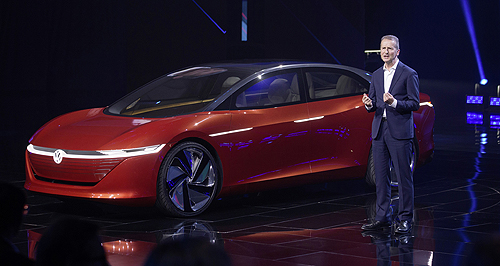Make / Model Search
News - VolkswagenBeijing show: VW goes big on EVs in ChinaClear Vizzion: Volkswagen’s all-electric ID Vizzion prototype is presented to Chinese journalists in Beijing by new VW CEO and chairman Herbert Diess ahead of the Beijing motor show. Six plants to build Volkswagen Group EVs in China within just three yearsGallery Click to see larger images 25 Apr 2018 VOLKSWAGEN will start production of battery-electric vehicles in “at least” six factories in China by 2021 as part of a plan to roll out 40 new-energy models in as little as seven years in the world’s biggest motor market. VW Group and its Chinese joint-venture partners plan to splash €15 billion ($A24b) on electric vehicles (EVs) and other advanced technologies such as autonomous driving, artificial intelligence and mobility services, including robo-taxis. The plan was announced by VW’s new chairman and CEO, Herbert Diess, who said: “We are accelerating to make mobility cleaner, safer and more intelligent to really improve people’s lives. “We will be starting local production of battery-electric cars in at least six factories by 2021 in China.” By 2025, VW hopes to sell 650,000 fully electric cars in China where government policy encourages motor manufacturers to take the electric route. Globally, VW is planning 16 production sites for EVs to build three million battery powered vehicles a year in 80 models across its multiple brands. Mr Diess made the announcement on the eve of the Beijing motor show while showing off a line-up of new models, including the first EV launched in conjunction with new joint-venture partner JAC Motors (Anhui Jianghuai Automobile Group) under a new brand, Sol. Called Sol E20X, the small SUV is an affordable battery-electric city wagon based on an existing JAC model, the iEV7S. Powered by an 87kW/270Nm electric motor, the Sol E20X has a claimed range of 300km. It will appear in showrooms in the third quarter of this year. In China, VW has existing joint ventures with two of the country’s biggest motor companies, SAIC Motor and FAW Group. Although China has foreshadowed a change of rules to allow foreign motor companies to build vehicles in China in their own right, VW indicated at last night’s event that it was happy with the current joint-venture arrangements. “As the world’s biggest automotive market, China plays a prominent role across all group brands,” Mr Diess said. “The strong bond with our joint ventures and business partners will remain.” Among the line-up of vehicles on the stage at the pre-show event was the fully autonomous ID Vizzion electric large sedan prototype that is thought to be the replacement for the VW Phaeton flagship. The ID Vizzion is based of VW Group’s new modular MEB electric vehicle platform that will underpin EVs of all sizes and shapes, from compact hatchbacks to large SUVs, starting in 2020. Originally shown at the recent Geneva motor show and slated for production in 2022 “at the latest”, the ID Vizzion appears to be a certainty for the Chinese market, although there is no suggestion – yet – that it will be made there. Similarly, the Porsche Mission E Cross Turismo crossover sportscar from Geneva also showed up in Beijing, indicating that the production version – thought to be slated for unveiling next year – will be sold in China. One car that definitely will be made in China is the new third-generation Lavida small sedan made by SAIC Volkswagen. This time based on the Golf’s MQB platform, the new Lavida will be charged with continuing Volkswagen’s dominance of the Chinese small-car market. Last year in China, Lavida accounted for 450,000 sales out of 3.3 million VW-badged vehicles.  Read more14th of March 2018  Volkswagen EV launch ‘every month’VW Group puts pedal to the metal for ‘world’s biggest electric vehicle fleet’6th of March 2018  Geneva show: Volkswagen exposes ID Vizzion flagshipID Vizzion previews Tesla Model S-fighting pure-electric sedan from Volkswagen20th of February 2018  Geneva show: VW teases autonomous ID Vizzion EVVolkswagen reveals future Vizzion with self-driving fourth member of ID EV family |
Click to shareVolkswagen articlesResearch Volkswagen Motor industry news |














Facebook Twitter Instagram